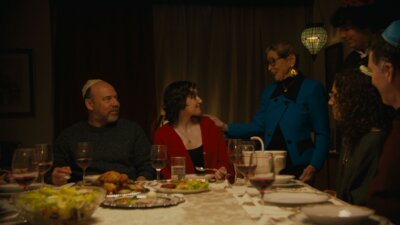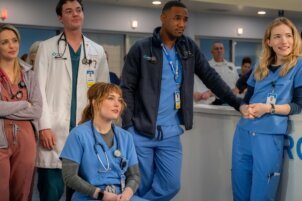
Courtesy of Sundance Institute | photo by Kevin Xian Ming Yu.
In the short film “Unholy,” writer/director Daisy Friedman artfully showcases Noa, a young adult with short bowel syndrome who uses a feeding tube while not being able to eat any solid food, as an individual who can manage the physical aspects of her disability but is confronting how her disability affects other areas of her life, including how she interacts with her family and observes an important religious holiday.
The first time I watched “Unholy,” I did so while in bed dealing with a flare-up of my own chronic health condition. Propped up by pillows, I watched this film that spoke so clearly to me, and I cried from recognizing myself in Noa. I recognized her frustration to explain what a chronic health condition does to a person, even if they could appear “normal” to the passerby. I saw myself as Noa struggled to fully participate in a meaningful Jewish activity with her family. And I saw myself as she struggled to be honest with her dad as he, with all good intentions, said it wouldn’t last forever, and with her grandmother as she pushed her to sip more soup, even when she knew her body was telling her no. Where I truly saw myself in Noa was as she struggled to be honest with herself, confronting her fears that if she cannot partake in the same traditions her family has done for generations, where does that leave her.
Friedman herself was born with gastroschisis, a birth defect where there is a hole in the abdominal wall and intestines form on the outside of the body. She later had a triple organ transplant and used a feeding tube for some of her childhood.
“The film is projecting myself into the future if the circumstances of then were similar to now,” Friedman said in an interview with Disability Belongs. “It’s also very much based on my own family.”
Friedman shared that several lines in the film are based on direct quotes from family members: “They can’t shake speaking about my transplant and my medical history in this very specific way.”
“Unholy” is relatable to many young adults, regardless of any connection to any religion, who are navigating their disability among their various family members. Friedman showcases a relatable scene: a young adult wanting to minimize any struggles with a parent and to not let down older relatives who have trouble letting themselves believe their children and grandchildren are facing any challenges.
Music plays an important part in showing Noa’s emotions throughout the film. Beginning with happy, upbeat background music, viewers see a family dinner being prepared. However, there is a shift in tone as viewers see Noa in an elevator looking uneasy while her parents are bickering about her even holding any food. As soon as the elevator door opens, the music turns hopeful again, until Noa’s grandmother, the strong matriarch of the family, comments on Noa’s weight and being too skinny. A horror score that pops up here and throughout the short film showcases both the internal horror if Noa’s body will reject what she eats as well as external horror that “all these people are watching me, and I don’t want to disappoint them,” according to Friedman.
Many faiths have traditions that, while may strive to be inclusive, often unintentionally exclude individuals with a variety of disabilities. In “Unholy,” Noa is joining her extended family for a Passover seder and dinner. Food is central to the celebration, both in terms of blessings being said during the seder as well as gathering for the actual meal. Noa navigates moments like dipping parsley in salt water for a blessing – which she can do without actually eating the vegetable.
Friedman wanted to “explore this relationship of food and love and Judaism and disability in a more forward way … because it’s not talked about and because we have a very narrow view in media, still, of disability, and what that can look like.”
“In religious spaces, no one asks the disabled person what they think would be good, but they kinda just assume, which leads to a world of problems, both in the film and otherwise.” Friedman continued. “It’s really prevalent, especially in Ashkenazi Jewish spaces, a lot of people don’t have disability to this extent, but people do have stomach problems. It’s a joke, but it’s really not funny. It’s not a joke if it’s really affecting you. It’s something people don’t want to talk about because it is so prevalent. So, I wanted to put it in people’s faces.”
In “Unholy,” Noa’s father is so focused on making the night “normal” for her while her mother hovers, worried about her grown daughter’s ability to take care of herself. While both are well intentioned, their actions ultimately cause Noa to feel even more ostracized.
The extended family is no better, with some treating her as a child (even speaking to her father about her instead of asking her questions directly when she is the same room as them) and others pretending there is nothing wrong. One cousin even congratulates Noa on still being alive. It is clear that Noa is able to manage the physical aspects of her disability – telling her overbearing relatives “I know how to take care of myself” – even if her family is unaware. In the middle of a central part of the seder – the asking of the four questions – a medical alarm goes off, forcing Noa to excuse herself. When she returns, her family cheers for her, making her feel further ostracized.
An important moment in the film occurs when the grandmother encourages Noa to try a spoonful of broth. As Noa brings the spoon to her mouth, the ominous music alerts viewers that this is a mistake. While the first spoonful makes it down – resulting in the grandmother downplaying Noa’s illness and saying, “all you needed was some of grandma’s soup and you’re cured,” the grandmother continues to push her to have more as her entire family watches.
This results in Noa throwing up while at the table, forcing Noa to confront how her health condition intersects with how she observes her faith. She shares how she used to feel holy when saying prayers or eating certain types of food, like her grandmother’s matzoh ball soup. “What if I never get to feel holy again,” she asks her father.
Ultimately, her father helps her realize that she still can connect, even if it may be different than before. He gives her a blessing that many Jewish parents give their children on Friday nights, restoring a bit of faith in her ability to still feel a connection to her religion. After all, “feeling holy” is a very personal experience and not one-size-fits-all.
After watching this film, Friedman wants “people to think more deeply about how spaces can be inaccessible and then made accessible and how nuanced this situation is.” She also said that if people can see themselves in the various characters of the film, “maybe they can think more about how to be more accessible in their own families.”
Friedman is one of the youngest filmmakers with a film at Sundance this year. Having her film chosen to be screened at Sundance shows “there is a need and a space for these kinds of stories.” Friedman currently is working on her next film, a psychological feature on medical gaslighting. For “Unholy,” Friedman is hoping for it to have as long a life as possible and to “reach and touch as many people as possible” via additional festivals and a hopeful home on a digital platform or streaming service.
“Unholy” is screening at the 2025 Sundance Film Festival as part of the Short Film Program 1. In addition to screening in both Park City and Salt Lake City, this film is available online. Some films in this short film program contain strobe effects.






